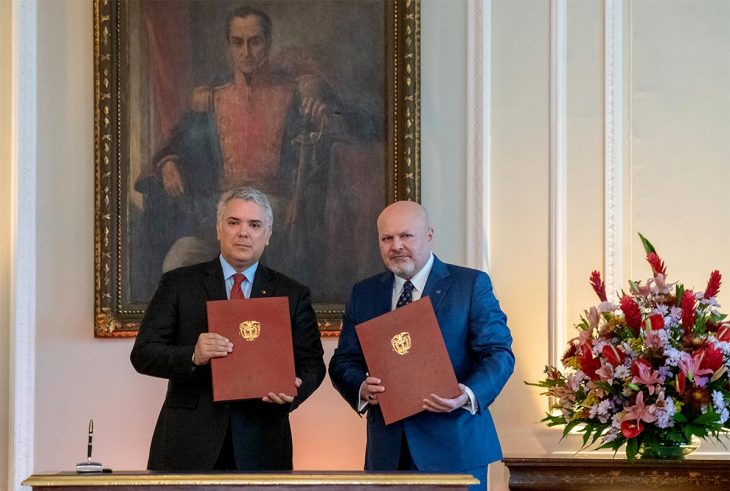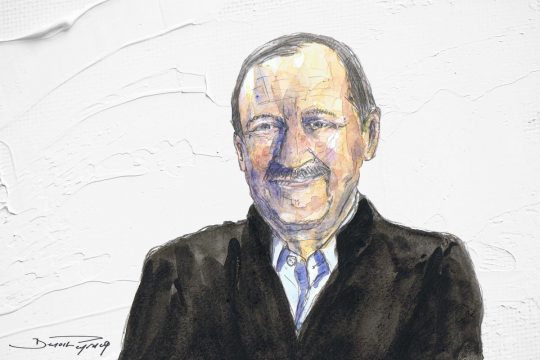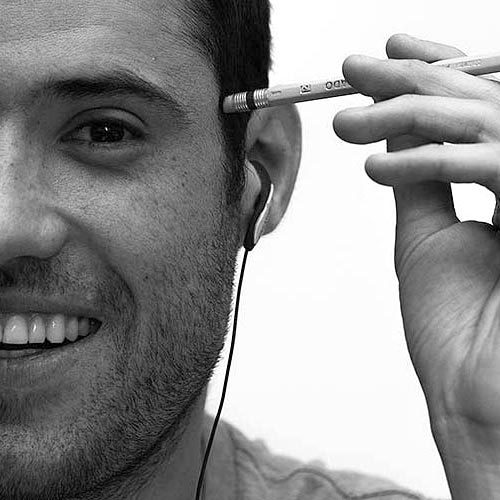After 17 years, Prosecutor Karim Khan decided to close the International Criminal Court’s longest-running probe on war crimes and crimes against humanity. “Colombia has stepped up to its international obligations, to its Rome Statute obligations and, consistent with the principle of complementarity, I’m delighted to say that I can step out of the preliminary examination stage”, he announced in a ceremony in Bogota’s presidential palace on October 28.
In choosing to end the Office of the Prosecutor’s exam instead of opening a formal investigation, the ICC endorsed the innovative transitional justice system stemming from the 2016 peace agreement with the Revolutionary Armed Forces of Colombia (FARC). It also gave a much needed backing to the Special Jurisdiction for Peace (JEP), the system’s judicial arm which is seeking to strike a balance between restorative and retributive sanctions – but which has struggled amid the current government’s efforts to undermine its work.
Khan, who took over as ICC Prosecutor last June, chose a new exit strategy to close the Colombia probe. He signed a “cooperation agreement” with President Iván Duque in which the government pledges to “ensure that the JEP is given space to do its do work”, that it is “properly funded” and, perhaps most importantly, that “there is no political or other interference in the process”.
Khan and Duque’s strange dialogue
At times, the presentation of the bilateral agreement seemed like a conversation between two persons on different subjects, with Duque downplaying the importance of the JEP’s work and Khan emphasising it.
“This agreement signed today shows the world that Colombia, in these 17 years of observation or preliminary examination, has strengthened its judicial institutions and now faces its greatest test of ensuring that this framework fully satisfies all victims”, said President Iván Duque. In his speech, he highlighted the work done by the Attorney General’s Office and by the Justice and Peace chambers that investigated crimes committed by the right-wing paramilitaries that demobilised during the administration of Duque’s mentor, former president Alvaro Uribe, back in the mid-2000’s. He only alluded vaguely to “the transitional justice in place” today, stressing his government’s funding of it, but not mentioning the JEP or the peace deal by name even once.
In stark contrast, Khan underscored the work being done by the JEP throughout his speech, calling on perpetrators to come before the tribunal and acknowledge their crimes, instead of choosing the adversarial route in its two-track system. “This agreement makes it clear, consistent with the Rome Statute, that if there is a fundamental change of circumstance, if space is not given [to the JEP], a preliminary examination can be reopened”, he warned, underscoring that the ground rules laid down in the agreement are “legally binding undertakings” and that his office will be monitoring the situation.
An endorsement of Colombia’s peace tribunal
Khan’s exit strategy was widely interpreted as a strong endorsement of the JEP. “This is a triumph for the peace deal and the JEP: for the first time the ICC recognises the transitional system of a country as being in line with the Rome Statute,” Sergio Jaramillo, the former peace commissioner who led the peace negotiations with FARC, told JusticeInfo. “The sole reason why it was closed are the JEP’s investigative efforts,” added its president and justice Eduardo Cifuentes.
The ICC’s decision comes months after the JEP unveiled its first batch of indictments, its clearest results so far. In January, following three years of investigation, the tribunal accused eight former FARC leaders over thousands of kidnappings and then in July it accused 25 former Army officials of having murdered 247 civilians and unlawfully passing them off as rebels killed in combat, a tragedy that Colombians have euphemistically called ‘false positives’. In both cases, the JEP charged them with war crimes and crimes against humanity, the harshest legal qualification possible.
The FARC commanders have already announced their willingness to accept the charges and own up to their responsibility. Their admission paves the way for the JEP to hand them 5-to-8-year sentences in a non-prison setting, provided it also deems that they’re answering to victims’ demands for truth and redress. Should they contest the JEP’s findings, their case would move to an adversarial track within the special tribunal and, if found guilty, face 15-to-20-year prison sentences. The indicted Army officials are expected to communicate their decision to the JEP soon too. The first rulings are expected before the end of this year.
This reality means that Khan and his prosecuting team deemed that Colombia is in fact, in the Rome Statute’s language, willing and able to fulfil its duties to investigate and prosecute the most serious crimes. It noticeably left the duty to punish out of the equation, trusting that the system in place means sanctions will be handed down.
Human rights NGOs caught by surprise
Khan’s announcement however came as a surprise to human rights organisations that have worked hand in hand with the ICC over the past two decades. While Human Rights Watch’s Jose Miguel Vivanco called the decision “premature, misguided and counterproductive” and warned that it “may leave the JEP more exposed to attacks on its independence”, most of the Colombian NGOs chose to strike a more positive tone and underscored the importance of the ICC’s support for the JEP and the peace deal.
“The most positive aspect is that the government recognises the importance and efforts of the transitional justice system and the JEP in an international agreement. Equally important is that the ICC prosecutor warns against any obstacle, initiative or reform – any of those three – that may affect it,” says Juan Carlos Ospina of the Colombian Commission of Jurists (CCJ), one of the country’s oldest human rights NGOs.
How protected the JEP is may still be a contentious point. Members of Duque’s party don’t see the agreement signed by him as legally binding. “I do not believe that it forbids making improvements or reforms that the judiciary or any other institution might need. It would be absurd to think that an international body obliges a state and its people to avoid modifying their institutions”, says lawmaker Gabriel Vallejo Chujfi, who co-authored a bill seeking to abolish the JEP entirely, but which is unlikely to advance due to time constraints. On the other side of the aisle, JEP president Cifuentes warned that “as soon as we become aware of any interference that affects our mission, we’ll be the first to ask the ICC to intervene”.
Human rights groups are concerned by several ripple effects that the ICC prosecutor’s exit strategy could have – something they told him the evening before the signature. In that meeting at his hotel, Khan declined to confirm the impending announcement but asked them to trust his judgment, according to two persons who were present.
They were especially dumbfounded by what seemed a change from the strategy set in motion by his predecessor Fatou Bensouda, who opened a consultation process with civil society in June to identify which “benchmarks” could best monitor progress in making justice. Five Colombian NGOs jointly submitted their proposals in late September - and felt these were not reflected in the agreement, even though Khan assured them they had been. “The word ‘victims’ doesn’t appear even once, and ‘civil society’ only does so to refer to the fact that there is one in Colombia”, Ospina says.
Spotlight on sexual violence
Local human rights NGOs all recognise progress on prosecuting extrajudicial executions, but warn that none of the JEP’s decisions are written in stone yet. As Ospina says, Khan “made the call taking into account the JEP’s design and operation, because there are still no rulings. Indictments do not mean sanctions”.
Others stress the fact that less progress has been made regarding sexual violence and forced displacement, two of the other crimes singled out in the ICC 2004 preliminary examination because of their impunity levels. While the JEP opened a macro-case on false positives, it has only investigated the other two as part of broader cases focusing on specific regions or population groups, such as kidnapping victims and former child soldiers.
Khan told human rights groups that he spoke to the JEP about this, but they don’t anticipate changes. “We don’t believe the JEP wants to open a macro-case on sexual and reproductive violence and attacks on the LGBT population. We have requested it for two years, but the JEP president is now speaking of ‘umbrella cases’ where it would be lumped with other crimes. This shows they don’t see it as an autonomous crime which played a role during war”, says Adriana Benjumea, whose organisation Humanas is a member of the Coalition for the ICC.
Benjumea personally reminded Khan that during his swearing-in ceremony he pledged to prosecute sexual and gender-based crimes. She argued that justice is sorely lacking outside the JEP’s jurisdiction, with 90% impunity levels on sexual violence cases in the criminal justice system and 75% in the specialised chambers for such crimes committed by the paramilitaries. As Justice Info has told, it’s a point raised by hundreds of victims including most recently Jineth Bedoya, an award-winning journalist whose sexual abuse by paramilitaries on a reporting assignment led to an Inter-American Court of Human Rights ruling against Colombia just last month.
NGOs are also sceptical that the carrot-and-stick approach is just as effective after a probe is closed. In Benjumea’s words, “there is no precedent of a preliminary examination being closed only to be reopened a year later”.
“Two-way influence”
With Khan’s decision, the ICC closed an examination of a country where it wasn’t very clear whether it could play a judicial role, given that active mechanisms were in place domestically and that two successive peace talks – with paramilitaries and FARC – gave way to transitional justice proceedings that began closing the impunity gap.
Over those decades the probe has been effective as an element of pressure. Recordings showed that paramilitary bosses negotiating their demobilisation feared an intervention by the ICC. In similar fashion, government negotiators persuaded FARC and the Colombian military that blanket amnesties had to be off the table given that these would likely trigger the ICC’s decision to open an investigation. That paved the way for them to accept coming before a tribunal like the JEP, own up to their crimes and face sanctions.
Some researchers argue that it yielded other positive outcomes. “In reality the ICC has already intervened. It had a fundamental impact, which is shaping what will happen in Colombia in the next 10 to 20 years”, says René Urueña, a University of Los Andes professor who has studied the relation between Colombia and the ICC.
Urueña argues that there has been a “two-way influence” between the court and the country’s institutions. “This happened because negotiations with FARC took place within the framework of the preliminary examination. It was part of the reality of the peace talks,” he says. In Urueña’s view, Colombia’s peace deal is influencing the ICC’s view on non-prison sentences and the decision to focus both on those most responsible and the most serious crimes. Likewise, he believes the ICC helped shape Colombia’s strategic criminal policy on investigative skills on patterns and contexts.
A new understanding of positive complementarity
It was a rocky ride though. In 2013 then prosecutor Fatou Bensouda sent two strongly worded letters to Colombia’s Constitutional Court, criticising a constitutional reform passed by the government in Congress paving the way for a transitional justice that would focus only on those most responsible of the most serious and emblematic crimes. Colombia’s duty, she contended, was to investigate all crimes and selectivity was only acceptable for the ICC. This position was softened somewhat as peace talks with FARC progressed. In 2015 deputy prosecutor James Stewart publicly stated in Bogota that “in sentencing, states have wide discretion”. A year later, Bensouda celebrated when the peace deal was finalised and noted “with satisfaction” that it “excludes amnesties and pardons for crimes against humanity and war crimes”, while warning her office would keep an eye on proceedings.
René Urueña argues this turnaround was possible because the preliminary examination sparked an increased sophistication among Colombians in their understanding of international criminal law, which gradually led them to “speak ICC language” more fluently and understand what leeway it gave them.
He also believes that Khan’s exit strategy reflects another significant change – and possibly an additional way to understand positive complementarity. In his words, “the peace deal’s main success, both institutionally and socially, was to create a community of persons - within the JEP, in civil society, in academia – that acts as a local constituency for the ICC and whose political agenda is to defend the peace accord’s achievements. That did not exist before the peace deal, and the agreement with the ICC formalises that bond”.








